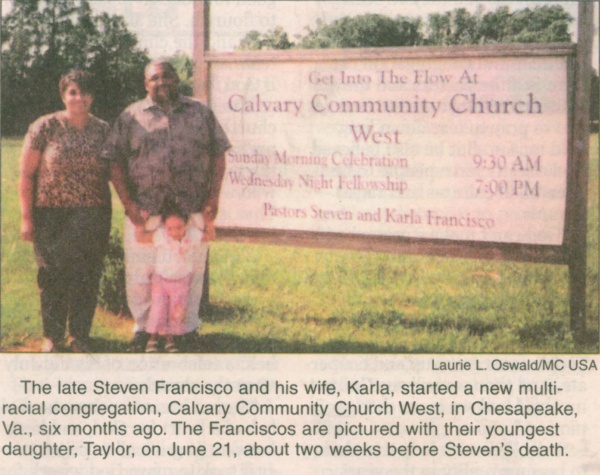If this site was useful to you, we'd be happy for a small donation. Be sure to enter "MLA donation" in the Comments box.
Francisco, Steven (1959-2004): Difference between revisions
No edit summary |
No edit summary |
||
| Line 5: | Line 5: | ||
text of obituary: | text of obituary: | ||
[[Image:Francisco_steven_2004.jpg| | [[Image:Francisco_steven_2004.jpg|600px|center]] | ||
<center><font size="+2">Pastor's death leaves his new congregation to continue his vision</font></center> | <center><font size="+2">Pastor's death leaves his new congregation to continue his vision</font></center> | ||
Revision as of 19:38, 6 January 2011
Mennonite Weekly Review obituary: 2004 Jul 19 p. 1, 2
Birth date: 1959 Mar 12
text of obituary:

By Laurie L. Oswald
MC USA News Service
CHESAPEAKE, Va. — Right up until he died suddenly July 6 due to complications from surgery, Steven Francisco, 45, a longtime leader at Calvary Community Church in Hampton, was doing God's work, including planting a multiracial church.
Francisco served as associate pastor with his brother, Bishop Leslie Francisco III, senior pastor at Calvary, until the end of 2003. Then he launched Calvary C9ommunity Church West in Isle of Wight County. His wife, Karla, also a pastor, and a church-planting team joined him.
The new congregation — where about40 to 50 people attend — is one of several that Calvary Community has spawned in the last several years.
In an interview June 21, about two weeks before he died, the couple described how they were shaping Calvary West into a multiracial congregation. They wanted to help Calvary Community realize its dream of reaching out to all people and to help Mennonite Church USA be an antiracist denomination.
Steven Francisco became involved in the wider church when he coordinated the youth convention for the Mennonite Church and General Conference Mennonite Church at Nashville, Tenn., in 2001.
At Calvary West, the Franciscos embraced the challenge of starting a multiracial congregation.
"We've worked hard to use a blended worship style that includes not only gospel songs that the African-American community is familiar with but also contemporary worship music of all styles, Seven Francisco said.